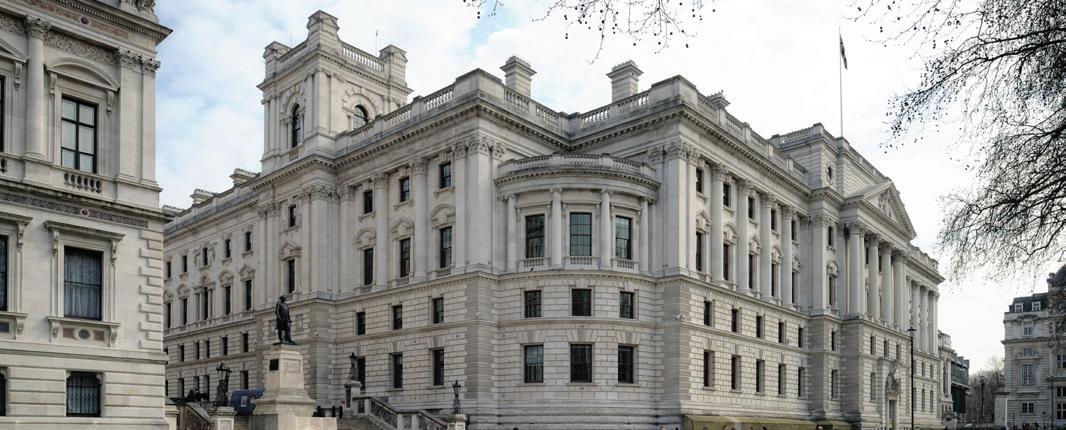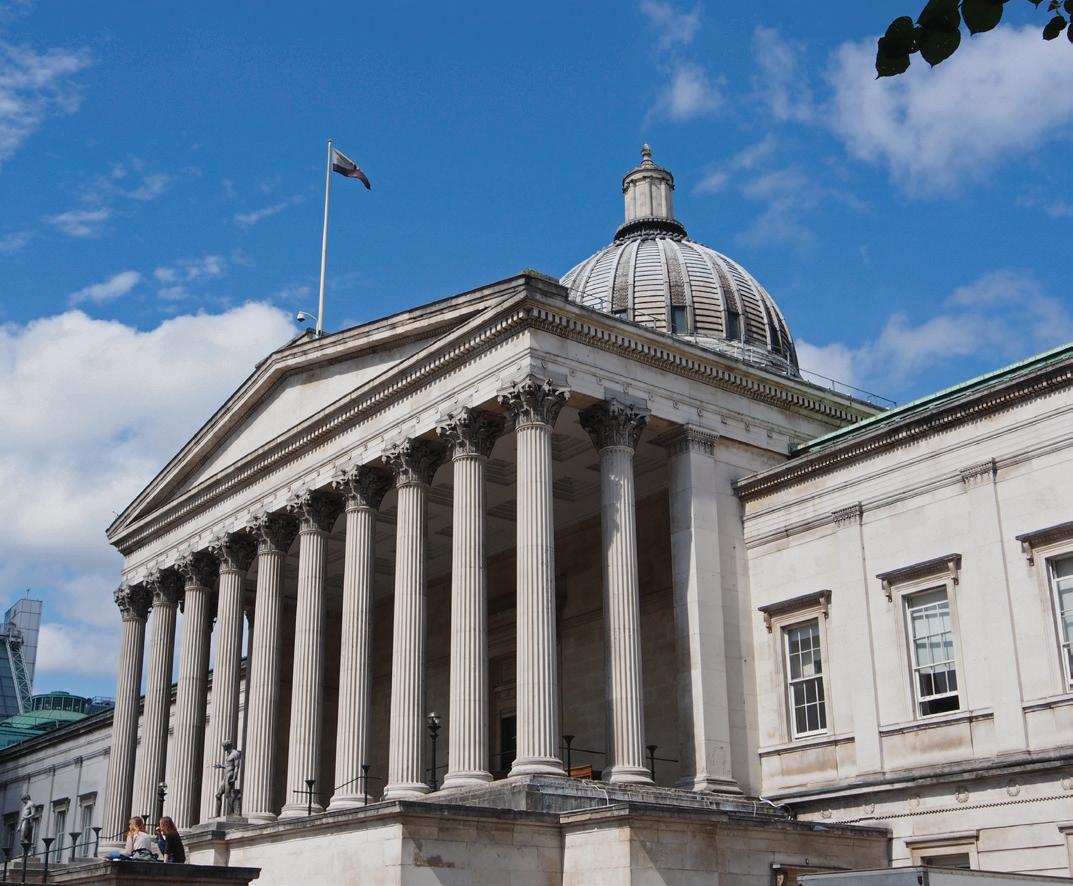
38 minute read
13 14 15 16 17 18 19
Covid-19
Twitter users accuse GEMS Education of creating fake accounts to promote positive image
Twitter users have accused GEMS Education of creating and using fake user accounts to promote a false positive image, calling on Dubai’s education watchdog to curtail what they suggest is a propagandistic press campaign.
In a tweet published on 17 April, a user named Moe Aamer shared screenshots of what he said was a “small sample of recently created fake accounts to tweet positively” about the United Arab Emirates’ largest for-profit school operator.
The accusation followed a weeks-long spat between parents of children enrolled at schools owned by GEMS and the group over its unwillingness to offer outright discounts on tuition fees at a time when a turbulent economy ushered in by the coronavirus pandemic has led to widespread job and income losses.
Aamer’s tweet went on to say: “@KHDA we need your support to #HelpGEMSParents.” KHDA refers to Dubai’s Knowledge and Human Development Authority, the emirate’s education regulator, which recommended that schools offer discounts where possible but stopped short of ordering them reduce fees.
In another tweet, Aamer shared a screenshot of a condition pertaining to GEMS’ new relief fund, which was rolled out to provide financially stricken families with discounts after more than 15,000 parents signed a petition calling for fee cuts. He said: “Wow @GEMS_ME. The discount is for three days. Failure to pay it, discount will be withdrawn. It’s like take it or leave it. @KHDA please do something! I hate how this practice pressure (sic) and how irresponsible they are in their communication #HelpGemsParents.”
A screenshot accompanying the tweet shows an excerpt of what is thought to be a letter from GEMS to parents regarding the fund. It reads: “To avail your relief package, you must pay the balance of the discounted tuition fees within three working days from today. Failure to comply will result in the relief discount being withdrawn.”
According to GEMS, more than 20,000 students’ fees will be covered by the relief package, which in some cases will provide discounts of 50% or more – but only if parents can provide documents evidencing that their finances have been negatively impacted by Covid-19.
An account using the handle @DubaiNameShame, which is accompanied by a blue tick, tweeted on 17 April: “Amazing how the new PR directive from @GEMS_ME has suddenly ignited Twitter accounts set up in April 2020, account have rarely tweet (sic) and accounts from Gems teachers and staff!”
Eton College offers free online education
The headmaster of prestigious English private boys’ school Eton College, Simon Henderson, has written to the head of every state school in the UK offering their pupils free use the school’s online self-study course etonx.com in response to the Covid-19 pandemic.
The schools can email etonxoffer@etoncollege.org.uk and Eton will supply them with all the relevant information.
Eton sent all its pupils home in March and is offering its boarding accommodation to key workers in an effort to protect them from the illness.
Another user replied to the tweet, saying: “Gosh Twitter is overrun in the last few seconds with a load of positive GEMS tweets. The bots have woken or instructed?”
The new accusations risk further intensifying relations between GEMS and its students’ parents, many of whom were incensed after they received a “threatening” email from the organisation in which it said students would be pulled from online classes if tuition fees were not paid. GEMS said in the email: “This is a final reminder to settle your child’s school fees. If payment has not been received by 12 PM on Tuesday, 21st April 2020, then we have no choice but to remove your child from access to our remote learning programme from Wednesday, April 22.”
Elite UK private schools reject fee cuts
Some of the UK’s most eminent private schools have refused to reduce tuition fees while also applying for public funds that would be used to pay staff salaries.
Elite institutions including Westminster, Dulwich and St Paul’s in London have resisted demands from parents to lower fees for the coming term at a time when all schools are closed and teaching is being carried out online due to measures enforced in response to the Covid-19 pandemic.
Parents with children enrolled at these private schools and others are incensed because some schools that have refused to reduce tuition fees have also applied for taxpayerfunded grants to cover the salaries of furloughed staff.
They argue that the annual fees they pay – which can be as high as £40,000 – cover schools’ operating costs, including staff salaries, under normal circumstances, and should thus be sufficient at a time when all learning takes place online and amenities and extra-curricular activities are off the cards.
According to the Financial Times, a group of 50 parents with children at Westminster, which has offered only boarders a fee reduction of 28%, have written to the school’s governors calling for a cut to fees for all students, funded by its reserves.
One parent likened Westminster to Liverpool Football Club, which despite being bankrolled by a multibillion-pound owner has applied for public funding. “They are applying for taxpayers’ money to fund salaries yet our school fees that are still being collected would normally be sufficient to cover these. This does not sit well with myself or other parents,” the parent said.
But Patrick Derham, headmaster of Westminster, which is classed as a chairty and reported income of £30.2 million in 2018, has said that his school will credit parents at the end of the summer term once any cost savings have been calculated.
Dulwich will look to do the same, according to headmaster Joe Spence, who said that his school is exploring additional support for families that have been financially impacted by the coronavirus pandemic.
The chairman of governors of St Paul’s, which is continuing to charge full fees while waiving boarding charges, said in a letter to parents: “I do commit to handing the savings back to parents when the position is clear. We expect to achieve at least a 10% rebate on fees and will inform you before the end of the summer term.”
Covid-19
Fee for all: Nord Anglia sparks parental backlash by failing to offer discounts across the board
Schools belonging to large international groups in jurisdictions including Hong Kong are being bombarded with requests from parents to cut tuition fees after sister schools offered reductions and rebates.
More than 240 parents with children enrolled at Nord Anglia International School Hong Kong have demanded a 30% reduction to tuition fees, warning that they would withdraw children from classes if the school did not respond by 15 April, according to the South China Morning Post.
Hong Kong-based parents made their case for fee discounts just days after Nord Anglia’s Dubai school offered its parent base a 15% discount in fees for the third term, throughout which lessons will be hosted online due to school closures enforced in response to the Covid-19 pandemic. A petition filed by Nord Anglia parents in Dubai gained more than 700 signatures.
Parents at Nord Anglia International School Hong Kong, which according to financial reports lost HK$49.5 million (£5 million) in 2017-18, suggested that the school take a cue from its Dubai counterpart and reduce fees to ease the financial burden on parents whose incomes have been negatively impacted by the coronavirus pandemic.
One parent reportedly told the South China Morning Post that it was “inappropriate” that Nord Anglia’s Hong Kong branch would not offer discounts, even though the firm’s Dubai offshoot had done so.
The common demands of disgruntled parents across the world with children enrolled in schools owned by large international organisations underscore the moral challenge of reducing fees only at select schools, but not all, during a time of crisis. Other global operators of private schools, including GEMS Education, Inspired and Cognita, could face similar demands in the coming weeks from fee-paying parent bodies across dozens of countries.
Nord Anglia International School Hong Kong’s principal, Brian Cooklin, told parents on 14 April that the school had already frozen fees for the 2020-21 academic year and, therefore, could at present offer no further reductions.
“It is not possible to provide a discount on tuition fees without damaging the service being provided,” Cooklin wrote in an email to parents. “This could only be achieved through redundancies of teachers, as staffing is the major expenditure.
“We have introduced pay cuts, a recruitment-and-pay freeze, and reduced other costs for the next session.
“We’ve also frozen fees for the next year. We have received many messages of thanks from parents for taking this step and for how our teachers have navigated this crisis to ensure our students continue to receive high-quality education.”
Teenagers due to take GCSE and A-level exams in England this summer are to be given predicted grades by their teachers after exams were cancelled because of the coronavirus crisis.
The UK government stated that exam boards will have a role in checking the suggested grades, and students will have a right of appeal. They will also be given the chance to sit an exam when their school reopens, if they disagree with their allotted grade.
The announcement is likely to be bad news for the substantial body of individuals and companies that provide tutoring support to schoolchildren prior to their examinations.
English schoolchildren to be given predicted grades after exams cancelled
The UK government is planning limits on the number of students that universities in England can recruit in the wake of the Covid-19 pandemic, The Guardian reported.
A cap is being placed on the number of UK and EU undergraduates admitted for the academic year starting in September.
UK universities are facing a huge gap in tuition fees as international students from China and other countries cancel or postpone enrolments due to the Covid-19 crisis. The move is being introduced to stop certain universities scooping up domestic students to fill their courses, leaving other, less prestigious institutions, without students.
UK government to cap university admissions
Cooklin’s response was sent to 248 families representing more than 315 students at Nord Anglia International School Hong Kong, who since February have been taking online classes because authorities in the territory ordered all schools to close until mid-April.
Parents, many of whom have taken pay cuts amid a turbulent economic climate, say that online lessons are inadequate and do not reflect the school’s fees, which range from HK$75,000 to HK$182,000. They are also seeking further cuts to fees for the September term, should schools remain partially or fully closed.
Nord Anglia has 61 international schools, boarding schools and private schools scattered across nearly 30 countries. The company, which in 2017 was valued at $4.3 billion, is owned by Baring Private Equity Asia and a Canadian pension fund.
The move is reported to be supported by higher education leaders and will be the first such limit since the university admission cap was lifted in 2015.
Alistair Jarvis, chief executive of Universities UK (UUK), the group including most of the mainstream English universities, said: “The UUK board discussed a range of measures needed to promote financial stability of the sector in these tough times. Foremost was the need for government financial support for universities. Student number controls were discussed and it was agreed that further consideration of the pros and cons were needed, with further input from members.”
Covid-19
UK Treasury reluctant to grant universities £2bn bailout
The UK Treasury is pushing back against calls from the country’s universities for a £2 billion bailout, according to the Financial Times, stoking fears of bankruptcies in a sector that has been hammered by Covid-19.
The Treasury’s opposition to a sector-specific bailout package, which according to the FT has been confirmed by “officials from three Whitehall departments”, comes as universities continue to warn of potentially irreparable holes in their balance sheets come September, should international student enrolments take a substantial hit. Revenue from international students contribute nearly £7 billion a year to the UK higher education sector.
Whitehall is reportedly divided over how to approach a stimulus package, which universities argue is essential to protect research departments that will play an integral role in solving problems linked to the Covid-19 pandemic.
Universities UK (UUK), the higher education sector’s lobby group, has tabled a proposal in which it promises to cut costs, accept restructuring and curb predatory admissions policies that risk leaving less prestigious institutions worse off financially. Rishi Sunak, the UK chancellor, is expected to review UUK’s proposal in the coming days, according to the FT. But the newspaper’s Whitehall sources – who have stressed that no final decision has been made – have said that the early signs suggest the Treasury is not receptive to what is considered “special pleading” from universities.
The Treasury believes that institutions should instead take advantage of furlough schemes and crisis loans before seeking any

further bailout, according to the FT, which reported that the departments of education, health, and work and pensions signalled support for a bailout last week during a crossdepartmental meeting.
Alistair Jarvis, chief executive of UUK, said there was “urgent need” for clarity on financial support. He warned of significant cost-cutting in the sector if the government does not intervene in the coming weeks.
“ W i t h o u t g o v e r n m e n t intervention there is a real risk that some universities will go bankrupt, which will have significant adverse impact on those local communities which can least afford it,” he said.
Wall Street English, a global provider of English-language tuition, will wind down its China operations, this publication can confirm, highlighting fatal operating conditions ushered in by the Covid-19 pandemic.
The organisation, which is backed by Baring Private Equity Asia, “has been losing a lot of money over the past 18 months and the Covid crisis tipped it over the edge,” a source at a rival organisation told this publication. The source said that they “can confirm” Wall Street English’s China arm will close as early as next week.
The Covid-19 pandemic, which closed thousands of schools worldwide and forced more than one billion students’ education online, has exposed the fragility of centre-based delivery models, many of which have struggled to pivot quickly to digital provision.
Wall Street English to wind down China operations as coronavirus crisis bites
“The [Chinese] staff were told around 10 days ago to stop all sales and that the business would close month end,” the source said.
“It’s a massive business but badly structured for the change [to online provision] in the Chinese market and the rising cost of personnel,” the source added.
According to reports, Wall Street English has more than 70 centres across China, most of which are located in top-tier cities. It is one of the organisation’s largest markets.
David Kedwards, chief executive of Wall Street English, told this publication in an email that “we don’t comment on press speculation, particularly as the Covid-19 outbreak has created unprecedented stress across the global economy and resulted in a large degree of unfounded rumours.
“We are, however, making various adjustments to the business model to ensure we can meet the needs of our students and employees, which can often spin into more dramatic rumours.”
Earlier this month, the government announced that it would place caps on the number of domestic and European undergraduate students that universities can admit in the next academic year, in a bid to prevent certain institutions scooping up students and leaving others with empty courses.
Hong Kong-headquartered Wall Street English derives the majority of its revenues from delivering face-to-face tuition at more than 450 brick-and-mortar franchise sites situated in China and other countries across Asia, Europe, Latin America and the Middle East.
The closure of its China operations lays bare the brutal trading conditions resulting from contracting economies, site closures and exam cancellations that centrebased tuition providers – and other education businesses – worldwide are contending with.
This week, a private preparatory school in the UK announced that it would close this summer as the pandemic “unravelled” its continuity plans.
Founded in 1972, Wall Street English has an alumnus of more than three million students and the company enrolled 180,000 in 2019. The organisation, which has a presence in 28 countries, was acquired by Baring Private Equity Asia – co-owner of international schooling giant Cognita – and CITIC in 2018 for $300 million from its former owner Pearson, the publisher.
According to reports published earlier this year, Wall Street English “forced” its employees in China to work throughout February on the expectation of full pay, but “a couple of days before pay day, Wall Street English cut pay by 50% and fired approximately 50% of their staff”.
Baring Private Equity Asia had not responded to a request for comment at the time of publication.
Covid-19
Over a third of international university students reconsider study abroad plans UCL study casts significant doubt on efficacy of global school closures
More than a third of prospective international university students are considering changing their study abroad plans, according to a survey, suggesting the pandemic could cause long-lasting financial scars on institutions worldwide.
Figures published on 14 April by Studyportals, a comparison website for overseas university programmes, showed that 40% of respondents to a survey were revising their plans to study in another country in light of global Covid-19 outbreaks. This figure had risen from 31% a few weeks prior.
The growing number of students out of the 850 respondents willing to alter their study abroad plans because of Covid-19 signals financial headwinds at universities in the UK, US, Canada and Australia, many of which depend heavily on incomes from foreign students, who tend to pay inflated tuition fees.
Students surveyed were mostly from key source markets, including Nigeria, India, Pakistan, Kenya, Ghana and Bangladesh.
Of the 307 students who told Studyportals that they were reevaluating their options, 152 wished to postpone enrolment until next year or the year after, while 128 were considering enrolling on an online course. Some 66 respondents said they would not go abroad and would instead enrol at a university in their home country, while 36 were considering a different destination country and 33 would not pursue university studies at all.
At present, international travel remains prohibited in most parts of the world.
The survey’s findings were published a week after Moody’s, the global ratings agency, issued a research announcement saying that “the virus outbreak will negatively affect finances at rated universities in the US, Canada, UK, Australia, Singapore and Mexico this year”, as “lower-than-expected enrolments will reduce tuition fee income and put pressure on institutions’ budgets”. Moody’s had already downgraded the credit rating of the UK’s higher education sector in November last year, suggesting that the country’s universities would face a rise in borrowing costs.
In March, industry body Universities UK warned that institutions could face a £7 billion “black hole” come September, as the sector prepared to ask for a government bailout to cover widespread income losses from international students, particularly those from China. At the University of Manchester, for instance, one in eight students is Chinese.

University College London

The economic costs of closing schools could outweigh the “very weak” evidence supporting a policy that has been used by dozens of governments to combat the spread of Covid-19.
Governments across the world have in recent weeks moved to close schools and other education centres as part of national efforts to contain the spread of the coronavirus and keep pressure on health services at a minimum at a time when infections and deaths continue to rise.
But research carried out by University College London (UCL) has cast serious doubt on the efficacy of the widely used tactic.
“The evidence to support national closure of schools to combat Covid-19 is very weak,” said the research led by Russell Viner, a professor at Great Ormond Street Institute of Child Health, part of UCL.
“The economic costs and potential harms of school closure are undoubtedly very high.”
According to The Times, ministers in the UK government cited the report in private conversations around whether it should have looked to re-open schools after the Easter break, which ended on 17 April.
UCL’s research is an analysis of nine published academic studies and seven non-peer-reviewed publications that all examine the effects of school closures during pandemics, including this one and the 2003 SARS outbreak.
The research stresses that the majority of children who contract Covid-19 show no – or mild – symptoms and thus warns: “Policymakers need to be aware of the equivocal evidence when considering school closures.”
The study could be leveraged by government officials around the world to put pressure on education secretaries and leaders to consider re-opening schools as the pandemic continues.
Denmark announced plans to gradually re-open kindergartens and primary schools as part of wider plans to loosen restrictions on social distancing after the country saw a drop in the number of infections.
Early years
Revealed: UK lender refuses to bankroll nursery acquisition until target performs ‘in line with pre-Covid-19 levels’
A prominent UK lender has refused to bankroll an acquisition in the country’s early years sector until the target business can prove its financial performance is “in line with pre-Covid-19 levels” – signalling a potential credit crunch in coming months.
This publication has learnt that Lloyds Banking Group has refused to lend money to a prospective buyer of a UK nursery group because the bank does not yet know the severity of the financial impact that Covid-19 will have on childcare providers.
The bank has said it would not lend money to a suitor for a UK nursery group until it sees an evaluation of the target’s performance during the three months after lockdown measures are lifted. UK nurseries, along with schools, were ordered by government to close indefinitely on 20 March as part of wider measures intended to contain the spread of the new coronavirus.
In a letter seen by this publication, a banker from Lloyds told a prospective buyer of a UK nursery group “that CBIL [Coronavirus Business Interruption Scheme] has replaced EFG [Enterprise Finance Guarantee] at the current time and as this request is to refinance the existing debt and also support purchase of a new nursery business… it does not fall within the parameters of a Covid-19 support facility.
“In the circumstances as CBIL support is not appropriate, we are unable to proceed formally at this time.”
The banker goes on to say that “although we are unable to finalise formal support/funding at this time, our view to support the business with its application in the future remains positive, so agreement, in principle, is given subject to” a number of conditions, including “minimum three months’ MI [management information] to confirm existing and target business is performing in line with preCovid-19 levels”.
UK: Secondtime buyers acquire Derbyshire nursery
Valuations of nursery targets “will not, of course, be instructed until the above have been confirmed to the satisfaction of credit with management information to be provided and commented on by the valuer”, the banker wrote.
Other conditions outlined in the letter stipulate that “there are no further cashflow/working capital requirements in respect of Covid-19”.
The bank’s response signals an unwillingness to lend until several months after social distancing measures are relaxed – indicating that credit may be difficult to obtain, even once nurseries and other business are legally permitted to re-open.
Lloyds had not responded to a request for comment at the time of publication.

Little Leprechauns Day Nursery in Chesterfield, Derbyshire has been purchased by Anant and Tushi Popat, who having established themselves in the childcare sector, were looking for a second nursery setting to buy.
UK: Storal Learning acquires 20th setting
Expanding nursery group Storal Learning has established its 20th early years setting with the acquisition of Edgbaston Nursery School in Birmingham.
The nursery has a capacity for 94 children and provides care for children aged from newborn to five years of age. It had a ‘good’ rating after its most recent Ofsted inspection.
The sale was facilitated by commercial real estate firm Redwoods Dowling Kerr.
UK: Old Station Nurseries acquires Essex setting

Growing nurseries group The Old Station Nurseries has acquired Small Friends Day Nursery, located in Leigh-on-sea, Essex.
UK: Poppy & Jack’s acquires Nottingham setting
Poppy & Jack’s Group, an expanding nursery operator based in the Northwest of England has purchased West Bridgford Day Nursery, located in an affluent suburb of Nottingham, which provides childcare for up to 40 children. It is the group’s tenth nursery.
West Bridgford Day Nursery was sold on a freehold basis, having been marketed at £850,000.
UK: Kids Allowed acquisition takes Kids Planet to third place
Kids Planet became the third-biggest nursery group in the UK when it acquired eight Kids Allowed settings earlier this year.
Kids Planet now has 52 nurseries across the Northwest and the Midlands, providing nearly 6,000 childcare places, with only Busy Bees and Bright Horizons providing more.
The acquisition was funded by Barclays and Clydesdale Yorkshire Bank with further investment from BGF.

K12
GEMS Education founder mulls stake sale
The founder of Dubai-based GEMS Education, one of the world’s largest independent school operators, has reportedly held talks to offload some of his majority stake in the firm to raise as much as $200 million.
Sunny Varkey, who launched GEMS in 1959, is in discussions with bankers from Rothschild about finding new investors for the private equity-owned group as the Covid-19 pandemic continues to batter the education sector, according to Bloomberg, which cited people with knowledge of the matter.
But the investment bank has struggled to drum up interest amid concerns about the widespread economic impact of the pandemic, which has weighed on private schools’ revenues as fee-paying parents continue to lose jobs and income, forcing them to re-evaluate their outgoings. According to Bloomberg, whose report did not specify how large a stake might be sold, representatives for GEMS and Rothschild declined to comment.
School operators in the United Arab Emirates and elsewhere anticipate widespread losses in September as a result of reduced student numbers and reimbursements handed to parents who feel they have been shortchanged by the online education that has replaced their children’s school life. UNESCO estimates that more than one billion learners have been impacted by closures of education centres enforced by governments worldwide in response to the coronavirus outbreak.
News of Varkey’s exploration of a stake sale comes just days after a petition signed by more than 13,000 parents with children enrolled in GEMS schools piled pressure on the group to cut fees by

at least 30% after it was announced that learning would take place online for the remainder of the academic year. GEMS Education, which is part-owned by CVC Capital Partners, has agreed to offer discounts and deferments to families that can prove financial hardship has been induced by the coronavirus.
CVC, Europe’s largest buyout group, last year bought a 30% stake in GEMS from its former minority shareholders including Blackstone Group, Fajr Capital and Bahrain’s sovereign wealth fund. News of the transaction was revealed by this publication. GEMS Education, which is majority-owned by the Varkey Group, was valued in the region of $5 billion last May, at the time of the deal, which was equivalent to 15-times its earnings.
Dozens of international schools in Hong Kong are reportedly not complying with a government requirement that at least 70% of their students be non-natives.
Hong Kong: International schools flout restrictions on domestic student enrolments
The rule, which is designed to ensure enough seats in schools for children of ex-patriate families in the territory, is being flouted by 24 of 52 international schools, according to the South China Morning Post, which analysed official statistics.
Last summer, GEMS Educuation executives met with banks in London and New York to discuss a refinancing of debt worth some $1.65 billion. In July, the firm raised $900 million through a bond offering.
GEMS Education has a presence in the UK through Bellevue Education, a group of 19 schools, which it acquired in 2018.
Private girls’ school Roedean Moira House School in Eastbourne, East Sussex is to close at the end of the academic year this summer.
Roedean Moira House joined the Roedean Group of Schools in 2017. It announced on its website that it has exhausted all available avenues to try to find an alternative to closing, but current revenue levels mean it faces unsustainable financial losses.
UK: Roedean Moira House School to close
The proportion, which was raised from 50% in 2009, is not being met by 24 institutions, at which more than 30% of students enrolled are locals, compared with 18% and 21% in the two years prior.
It received several bids from investors which the school says it pursued as far as possible, but these have not led to a solution it was able to accept.
The school added that its partnership with Roedean has enabled it to secure the funding to meet all running and closure costs to allow it to operate until the end of the summer term, creating an ordered, solvent wind down.
Higher education
UK: Cash-strapped private university spared from bankruptcy by Chinese investor
A Chinese investment group has acquired an ailing UK private university in a deal that marks yet another example of a mainland buyer sparing a British education business from bankruptcy.
China Education Group has signed an agreement with Richmond, The American International University in London that will “secure the longterm future of the university”. The terms of the deal were not disclosed.
Richmond, The American International University, the only UK university that awards both UK- and US-accredited degrees, had faced financial difficulties after its wealthy founder and benefactor, Sir Cyril Taylor, died in 2018 and froze out the university from his £200 million fortune, the majority of which was left to a charity. Taylor’s will left the university only a “virtually worthless” strip of land in New Jersey, according to The Times.
Richmond, The American International University had enacted its “teach-out” plan, an arrangement whereby an institution that is set to close ensures its students can complete their studies.
Its acquisition by China Education Group is the latest link in a chain of recent transactions that have seen China-based investment firms absorb cash-strapped education businesses in the UK. In February, Chinese investors acquired Wisbech Grammar School in Cambridge. After crashing into administration five years ago, St Bees School, one of Britain’s oldest boarding schools, reopened in 2018 after being financially resuscitated by Shenzhen-headquartered Full Circle, which also owns a handful of UK language schools.
China Education Group owns a portfolio of universities, which includes nine institutions in China and King’s Own Institute in Australia. This academic year, the firm enrolled around 180,000 students.
China Education Group’s acquisition of Richmond, The American International University

will widen access to exchange programmes and internships and make the latter’s degrees more accessible to students in other parts of the world, the firm said.
The deal will afford Richmond, The American International University a “greater reach in international marketing and recruitment”, China Education Group said – suggesting it will seek to bolster its coffers by enrolling higher numbers of international students, who typically pay higher fees to study abroad.
But the transaction has been announced amid the Covid-19 pandemic, which has prompted governments worldwide to introduce international travel bans that have prevented students from dozens of countries, including China, from returning to their overseas studies. The UK higher education sector has voiced concerns about a potential multibillion-pound black hole in universities’ balance sheets come September, should international students be unable to enrol.
Boston-based Cambridge College has said it plans to acquire the New England College of Business and Finance (NECB), also based in Boston, which will integrate NECB’s programmes into Cambridge College’s operations beginning in the spring.
The transaction is subject to final regulatory and accreditation approvals by the Massachusetts Department of Higher Education and the New England Commission of Higher Education.
US: Cambridge College to acquire New England College of Business and Finance
Susan Ifill, chairwoman of the Cambridge College board, said: “From its earliest days, Cambridge College has strived to unlock valuable educational opportunities for as many people as possible, keeping quality high and tuition costs low. The Cambridge College community looks forward to leveraging the unlimited potential and opportunities that this acquisition will bring to our student communities.”
Founded in 1972 by Taylor, an education pioneer and ex-advisor to former British prime ministers Margaret Thatcher and Tony Blair, Richmond, The American International University is one of the UK’s oldest private universities.
It will continue as a self-governing non-profit organisation, according to a statement.
Malaysia: HOPE Education agrees to buy INTI Education Group
HOPE Education Group (Hong Kong) Company has agreed to buy Laureate’s INTI Education Group, a group of higher education institutions in Malaysia.
The transaction value is $140 million, which includes a $14 million payment to a minority equity shareholder. INTI Education Group will remain part of the Laureate International Universities network until the closing of the transaction, which is subject to customary closing conditions, including approval by relevant Malaysian authorities.
Founded in 1986, INTI Education Group joined the Laureate International Universities network in 2008 and today caters for more than 16,000 students enrolled in undergraduate and postgraduate degree programmes in a variety of academic disciplines, including biotechnology and life sciences, business, communications, engineering, computing and information technology, law, and hospitality.
HOPE Education Group (Hong Kong) Company is an established operator of higher education institutions, including universities and vocational colleges.
Vocational and skills training
UK: Government to pull plug on MBA apprenticeships
The UK government is poised to axe a controversial apprenticeship scheme that allowed companies to enrol senior executives on MBA courses using funds intended for on-the-job training.
Since the introduction of the apprenticeship levy in 2017, which forces large organisations to set aside money for workplace training, campaigners have argued that funds should be used to onboard school leavers and upskill standard employees – not to send executives to business school.
The move to scrap the MBA qualification, which was included as part of the level seven senior leader occupational standard, is expected to be confirmed in early June, when the government is due to publish a review of MBA apprenticeships.
Under levy rules, UK organisations with annual wages bills of more than £3 million must set aside an equivalent of 0.5% of their payroll each month.
Under the changes, companies will still be able to spend levy funds on high-level leadership training, but such schemes are expected to be less attractive as participants would no longer receive a master’s degree on completing programmes.
In the first full year following the introduction of the levy, the number of apprenticeship starts fell 26% compared to 2015/16, before the levy was introduced. Meanwhile, the proportion of high-level apprenticeships, equivalent to bachelor’s degrees and above, increased from 5.3% to 12.8% over the same period.
Learning Curve Group has acquired London-based hair and beauty training provider the London Hairdressing Apprenticeship Academy (LHAA) and its subsidiary, London Beauty Training Academy (LBTA).
Learning Curve Group already has hair and beauty academies in northeast and northwest England under its own name. It will continue to operate both LHAA and LBTA as stand-alone brands within the group.
The deal, for an undisclosed sum, will see Learning Curve Group establish its first fixed premises across the capital, with LHAA’s six hair academies and two LBTA beauty academies. Learning Curve stated it has plans for further growth once the businesses are fully integrated. All 80 existing LHAA and LBTA staff will transfer across, giving LCG a headcount in excess of 500.
Brenda McLeish, chief executive at Learning Curve Group said: ‘We’re delighted to be adding LHAA and LBTA to our already broad training provision and establishing a base in London. LHAA and LBTA are hugely impressive businesses that are delivering vital skills to learners across London. The business shared our values and vision of keeping the learner at the centre of everything we do, and we are looking forward to further growing the brands and helping make this in-demand provision accessible to even more learners.”
UK: Learning Curve acquires hairdressing apprenticeship company
Francine and Trevor Luker, founders and directors at London Hairdressing Apprenticeship Academy stated: “LHAA and LBTA have become established as sector leaders in the provision of hair and beauty training. We work with some amazing clients and we are beyond proud of the fantastic team we have here, and everything that they have achieved. The time was right for us to step back and gain further investment in the academies. This will enable them to grow and reach the amazing potential that we know they can. We needed LHAA and LBTA to be owned by an organisation that cared as much as we all do here, and with Learning Curve Group, we have found that perfect match.”
Learning Curve Group was supported in the deal by Burness Paull and EY, while LHAA was supported by Macintyre Hudson, SBP Law Solicitors and HW Fisher.
According to FE Week, a trade publication geared at the further education sector, there were 6,387 starts on MBA apprenticeship programmes up to the end of the first quarter of 2019/20. Because each of these courses can receive up to £18,000 from levy coffers, the publication claims that up to £115 million had been spent funding these qualifications.

Ed tech and educational services
China: Rising star GSX Techedu slides after damning short-seller report labels it ‘blatant fraud’
GSX Techedu, one of the fastestgrowing Chinese online education providers, has seen its share price slide after a damning report by short-seller Citron Research labelled the firm “the most blatant Chinese stock fraud since 2011”.
After climbing more than 90% between 1 January and 25 February, from $23.74 to $45.42, New Yorklisted GSX Techedu was trading at $29.67 on 16 April – two days after the report was published. Earlier this year, GSX Techedu became the first listed ed tech company to reach a market capitalisation of $10 billion.
“GSX Techedu Inc. is overstating revenue by up to 70% and should immediately halt trading and launch an internal investigation,” Citron said in the report. “They are not even in a ‘fake it till you make it’ situation. Their forward growth trajectory is as foolish and fraudulent as their previous financials.”
US law firm Wolf Haldenstein Adler Freeman & Herz announced on 15 April that it is investigating “serious and disturbing class action claims” about GSX Techedu on behalf of shareholders.
The allegations came shortly after GSX Techedu competitor TAL Education – one of the world’s largest education companies, also based in China but listed in New York – admitted to sales fraud.
Citron Research is the second short-seller this year to allege that GSX Techedu is a fraudulent organisation. In February, USbased Grizzly Research published a scathing report in which it accused GSX Techedu of fabricating student numbers, overstating profitability, offloading costs and committing capital expenditure fraud – concluding that “GSX’s success is actually based on a fraudulent scheme”.
Shortly after Grizzly’s report was published on 25 February, Sandy Qin, head of investor relations at GSX Techedu, rubbished the claims during a 30-minute phone call when contacted by this publication.
But there are parallels between allegations set out in both firms’ reports.
For instance, both Grizzly and Citron alleged that there was a major discrepancy between figures filed by GSX Techedu in credit reports in China and filings with the US Securities and Exchange Commission, Wall Street’s watchdog.
According to Citron, there was a “75% discrepancy in net profits”, which stood at nearly 80% in the final quarter of last year, according to GSX Techedu. This profit margin is considerably higher than that of competitors, including TAL Education, Yuanfudao and DAO.
In response to this particular allegation, GSX Techedu told Citron: “The gap between the company’s credit report and S-1 filing was actually GAAP difference between China and U.S. after the group’s restructured to spin-off 2B business in 2017. The difference is totally reasonable and legitimate and has nothing to do with operational numbers.”
However, after scouring filings related to a spin-off or divestiture alongside accounting experts, “the conclusion is that management is lying,” said Citron.
Global investment business Blackstone has agreed to buy the UK student housing company IQ for £4.7 billion, City AM has reported, in what has been described as the largest-ever private real estate transaction in the UK.
UK: Blackstone to buy student housing group
IQ Student Accommodations owns and operates 67 sites in 27 UK towns and cities and is one of the leading providers of private purpose-built student accommodation, with 84% of its portfolio value in Russell Group cities and 52% in London.
Both Grizzly and Citron also alleged that GSX Techedu has fabricated its student numbers, which is did, according to Citron, by “planting fake student users in WeChat groups”. This ploy, which was used to inflate revenues, is evidenced by identical student comments, explained Citron, which included in its report numerous screenshots capturing instances of duplicated feedback.
Citron stressed that investors should not take comfort in the fact that GSX Techedu is audited by a Big Four organisation.
“It is interesting to note that GSX’s auditor is Deloitte,” said Citron. “This is the same auditor that was used in the Longtop and China Media Express frauds – both exposed by Citron.
“We are not saying that all of their clients commit fraud, but don’t for a minute think because GSX has a Big Four auditor they are clean and that history won’t repeat.”
Blackstone is buying the business from Goldman Sachs, which owns 70% of the group, and medical charity the Wellcome Trust which owns 28%. The Wellcome Trust was one of IQ’s founding investors and the student accommodation group merged with Goldman Sachs’ student housing business in 2016.
EducationInvestor Global
Subscribe today to read our news and exclusives on educationinvestor.co.uk

NEWS IN BRIEF

xxx n Nurseries and primary and secondary schools in France will begin to re-open on 11 May as part of President Emmanuel Macron’s plans to jump-start the country’s economy following weeks of nationwide lockdowns.
Having set out plans to gradually lift restrictions enforced in response to the Covid-19 pandemic, France, which went into lockdown on March 17, will join European neighbour Denmark in permitting day care centres and schools to once again open their doors. From 15 April, Danish children aged 11 and under will be able to return to schools and nurseries, after a month of closures.
While children in France will gradually be allowed to return to schools and nurseries, universities will remain closed but students can continue classes online, Macron said. n Harvard University, one of the world’s best and richest higher education institutions, will receive $8.6 million in government aid to help it cope with Covid-19, despite having a $41 billion war chest.
The Harvard Crimson, the university’s student newspaper, shared news of the federal aid, which is intended to stop businesses from collapsing amid the ongoing global health crisis, via its Twitter account on 15 April: “Harvard University will receive nearly $9 million in aid from the federal government through the Coronavirus Aid, Relief, and Economic Security Act, the Department of Education announced last week.” n The leaders of eight Hong Kong universities have said they will donate portions of their salaries to help their institutions weather the financial impact of the Covid-19 pandemic.
The president and vice-presidents of the University of Hong Kong, Polytechnic, Lingnan, Education and Open universities said they would donate 10% of their annual salaries to combat challenges ushered in by the coronavirus.
Among heads to have committed to salary deductions is that of City University, which has also warned of a freeze to staff salaries next year due to a drop in revenues. n International Baccalaureate announced its May examinations scheduled for between 30 April and 22 May for diploma programme and career-related programme candidates will no longer be held.
Depending on what they registered for, students will be awarded a diploma or a course certificate which reflects their standard of work. IB stated: “This is based on student’s coursework and the established assessment expertise, rigor and quality control already built into the programmes.” n The universities of Cambridge and Oxford are both replacing this summer’s exams with online assessments, The Guardian has reported.
Cambridge students who cannot do this due to “illness, caring responsibilities or technical difficulties” are to be allowed to undertake the assessment later when the university is fully operational again. However, the university added that students won’t be allowed to defer their assessments until the next academic year. n The UK’s early years sector has called on the government to offer “far more help” to nurseries that will struggle to survive forced closures induced by the coronavirus pandemic.
This came as the government announced that nurseries across the country will be eligible for a business rates holiday for one year from April – a break offered to businesses in other sectors.
Business rates are a tax levied on properties used for business purposes. The tax varies in size, depending on a business’s ‘rateable value’.
But chief executive of the Professional Association for Childcare and Early Years Liz Bayram said providers were “extremely worried” about surviving the temporary closures.
“The support already announced by government will help, but far more is needed to ensure childcare providers can survive this period of closure and rebuild the service so many families rely on to balance work and home, once we have beaten covid-19,” she said.






